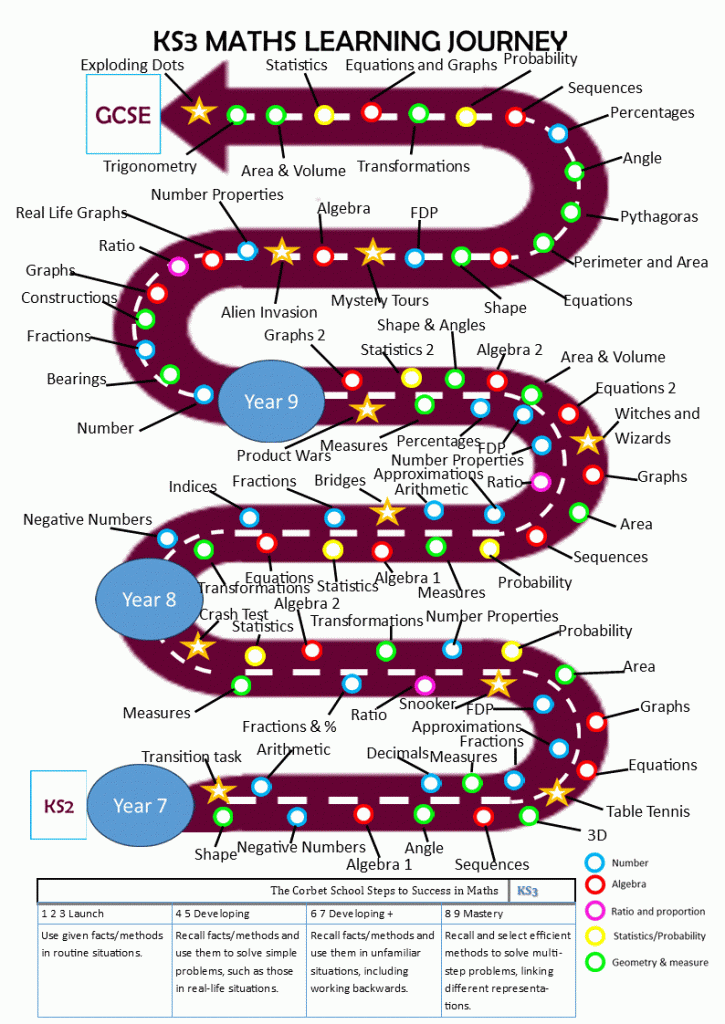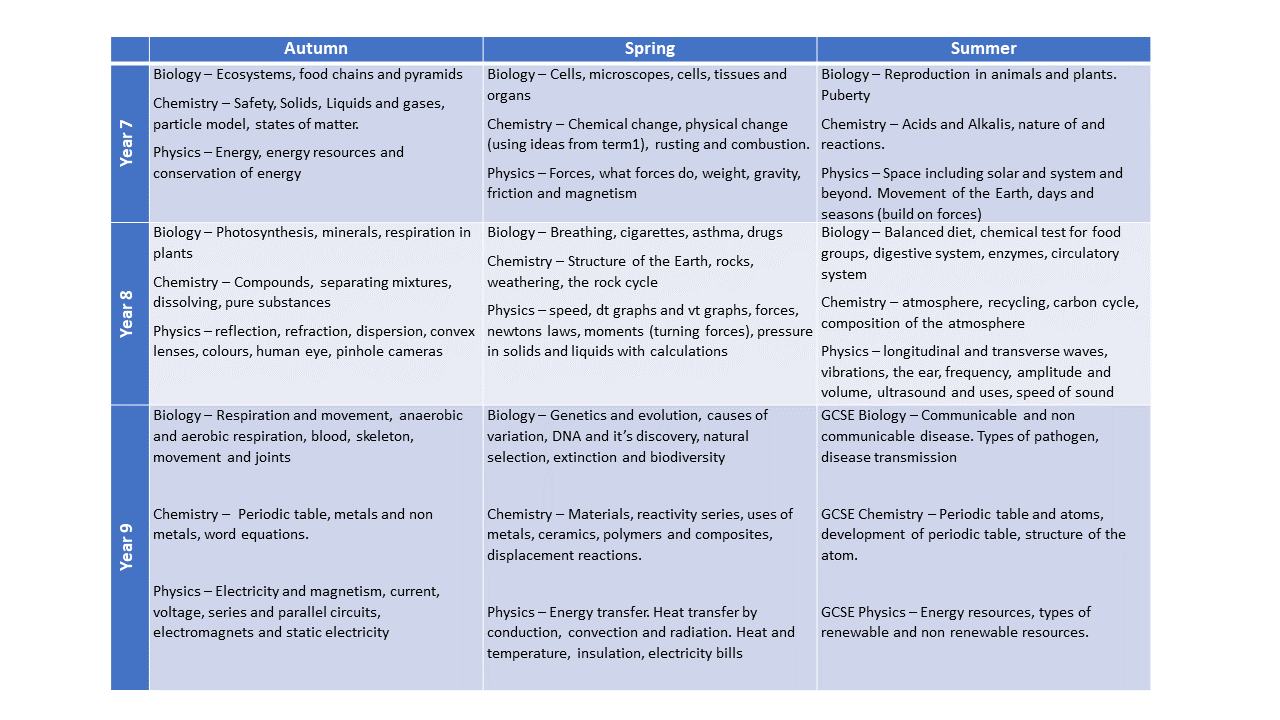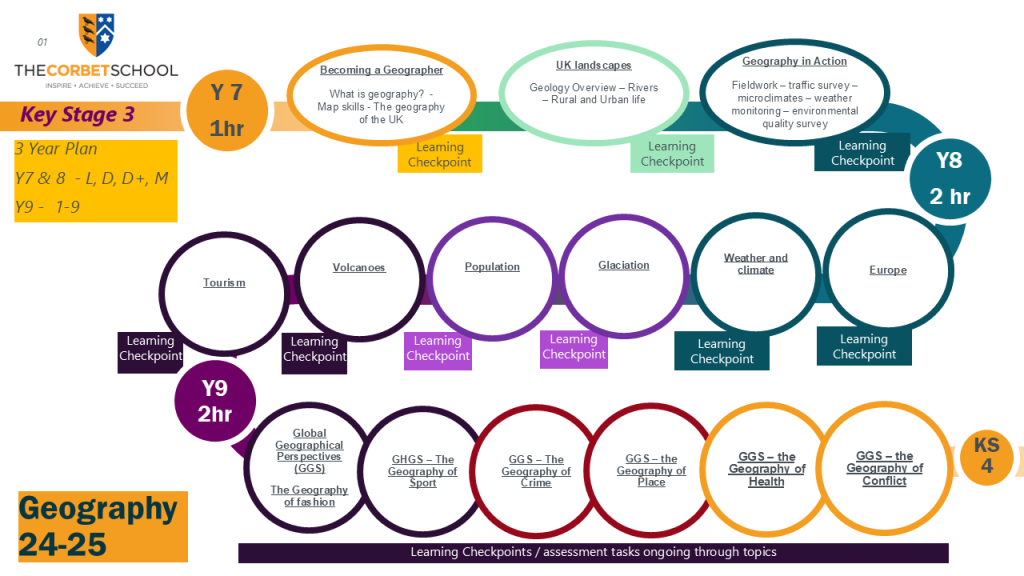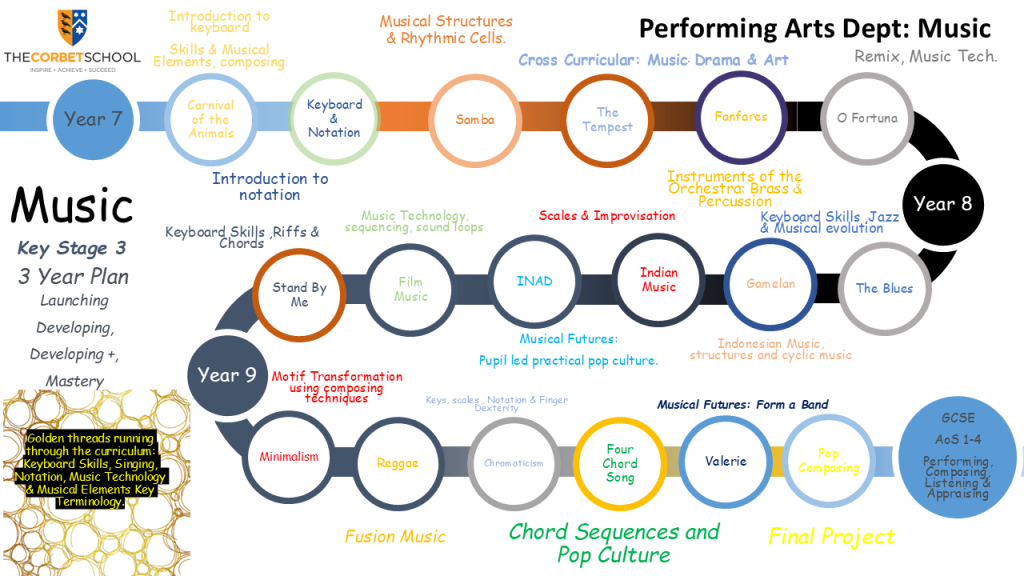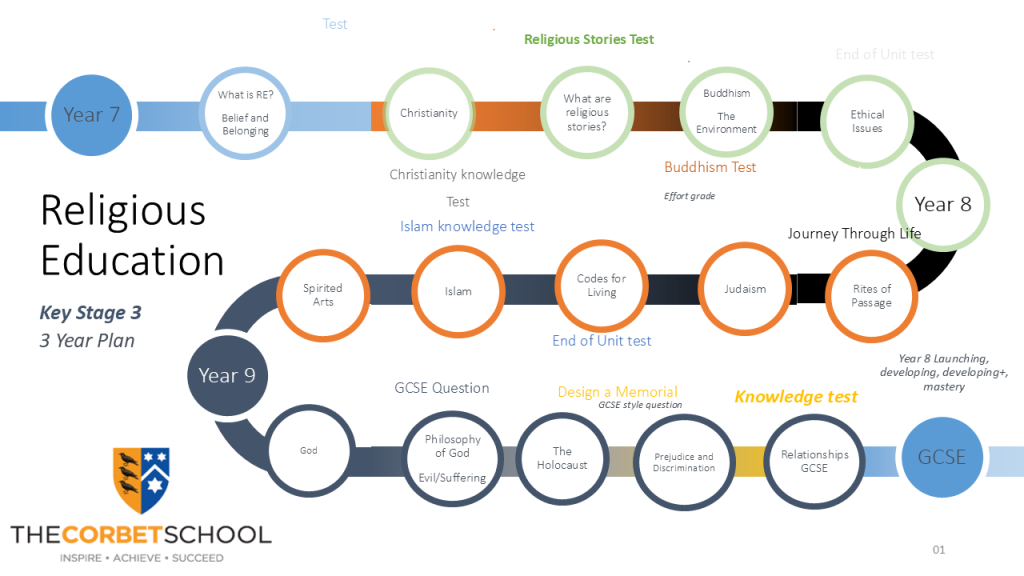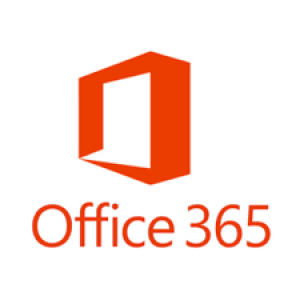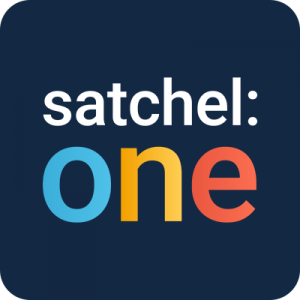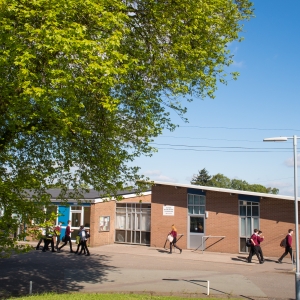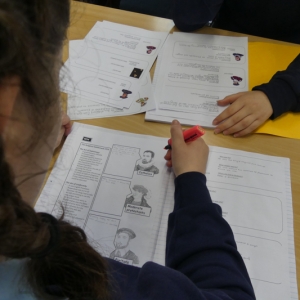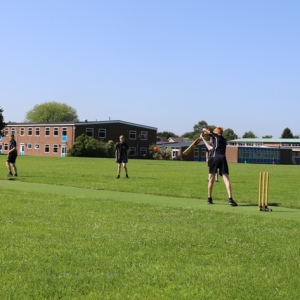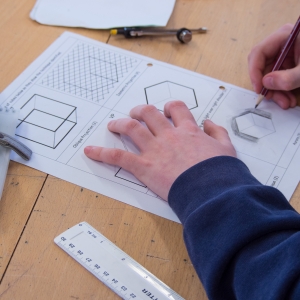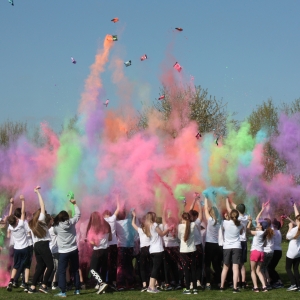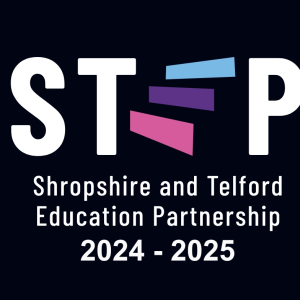During the first three years (7-9) at The Corbet School, all students follow a similar course, designed to give a sound general education and to provide the base upon which the more specialised studies in Years 10& 11.
All pupils in Year 7 will be allocated a language to study (French or Spanish). They will study this one language for the rest of their time at school resulting in a GCSE qualification.
Most lessons in the first two years will be taught in mixed-ability groups. However, the three core subjects; English, Maths and Science will be taught in ability groups.
In year 9, we support students and their parents in making choices from a range of GCSE courses to study in years 10 and 11.
All pupils in KS3 will take: (for further information on topics covered by each subject please click on the subject title):
Year 7
Autumn term – Childhood.
Students look at a variety of extracts from authors such as Charles Dickens and Roald Dahl exploring how childhood memories can be communicated through literature.
Spring term – Shakespeare's Legacy
This topic explores why Shakespeare is still relevant, and the lasting effect he has had on our language.
Summer term – Wonderland.
With Alice in Wonderland as the set text, students will delve in to the realm of make believe and discover Lewis Carrol’s weird and wonderful characters.
Year 8
Autumn term – Gothic.
Students explore the creation of the genre, influential texts such as Shelley’s Frankenstein and create their own gothic-inspired short stories.
Spring term – Conflict
Students read and analyse some of the most powerful pieces of poetry that survived wars from both past and present. They will also complete an author study on Wilfred Owen and learn about how his encounters with established writers such as Sassoon shaped his writing.
Summer term – Villians.
What makes the perfect villain? In this unit students analyse the conventions of villainous characters, focusing on Sherlock Holmes
Year 9
Autumn term – Out of this World.
Dystopian fiction is an ever growing genre; this unit provides the opportunity for students to learn about the conventions of the genre as well as completing a film study to see how these features can be communicated through film.
Spring term – Journeys
During this unit students study a text that explores a character’s journey to finding their new life. They will look at a variety of themes such as discrimination, identity and modern life.
Summer term – Relationships
During this unit students explore a broad range of text types such as prose, poetry and scripts. Influential relationships in fiction are analysed including Miss Havisham’s life of isolation and Romeo & Juliet’s romance and the conflicts they experience with their families.
Intent
The curriculum:
- builds on prior knowledge from KS2, ensures that skills are developed in all years and prepares pupils for GCSE
- develops fluency, deep conceptual understanding and connections within Mathematics, allowing learning to be embedded
- enables all pupils to function mathematically in day to day life
- stretches the most able pupils
- develops pupils as independent, resilient learners
- ensures that all pupils have range of learning experiences
- ensures consistency across the department in terms of content and approaches
Year 7
| 7 | Topic | Intent | Number Topic | Intent |
| Autumn | Shape | Pupils will learn the names and properties of 2D and 3D shapes, and labelling conventions for properties. They will learn to recognise similar and congruent shapes. | Sweets in a Box | Pupils will work on the key stage 2/3 transition task. They will develop their ability to reason mathematically and solve problems. |
| Negative Numbers | Pupils will learn how to use double-sided counters to make zero pairs. They will be able to add and subtract with negative numbers using the double-sided counters as a model while considering the additive inverse. | Arithmetic | Pupils will solve problems involving addition, subtraction, multiplication and division of integers. They will use place value to order decimals and multiply by powers of 10. | |
| Algebra 1 | Pupils will write expressions and consider multiple representations of these such as bar models and function machines. They will substitute values into these representations. | Decimals | Pupils will add, subtract, multiply and divide with decimals, using the order of operations. | |
| Angle | Pupils will practice estimating, measuring and drawing angles and they will learn to construct triangles. They will use basic angle facts to solve problems involving missing angles. Pupils will also learn about bearings and their relation to compass points. | Fractions | Pupils will use their knowledge of fractions to find equivalent fractions, simplify and convert between mixed numbers and improper fractions. They will add, subtract, multiply and divide a fraction by a fraction. | |
| Sequences | Pupils will continue and generate simple sequences. They will use function machines to find connections between variables and then use their previous learning to write these connections in algebra, leading to finding and using the nth term. | |||
| 3D | Pupils will find the volume of cubes and cuboids and will use isometric paper to draw these shapes in 3D. They will also draw plans and elevations of other 3D shapes. | |||
| Table Tennis | In this investigation pupils will work logically to organise a table tennis tournament in the most efficient way. | |||
| Spring | Equations | Pupils will form equations using the multiple representations covered in Algebra 1 and will use inverses to solve them. They will use algebra tiles to support the solving of equations with unknowns on both sides and introduce balancing. | Approximations | Pupils will round to the nearest 10, 100, 1000, whole number and decimal places. |
| Graphs | Pupils will interpret and sketch graphs modelling real life situations. They will use relationships in coordinates to find rules for straight line graphs. | Fractions, Decimals and Percentages | Pupils will convert between equivalent fractions, decimals and percentages. | |
| Area | Pupils will find the area of rectangles, triangles, parallelograms and compound shapes. They will investigate the ratio between the diameter and circumference of a circle and practise finding the circumference of circles. | Ratio | Pupils will learn to express, simplify and find equivalent ratios. They will share in a ratio and solve problems involving direct proportion. | |
| Probability | Pupil will be introduced to the probability scale and they will use equally likely outcomes to find the probability of a single event. | Snooker | In this investigation pupils will look for patterns in the number of touches a snooker ball makes and which pocket it lands in for different size tables. | |
| Number Properties | Pupils will learn about the properties of whole number including square, cube and triangular numbers, multiples, factors and primes. They will find the HCF and LCM of two numbers and be able express a number as a product of its prime factors. | |||
| Summer | Transformations | Pupils will reflect, rotate and translate shapes. They will identify reflection and rotational symmetry in 2D shapes. | Fractions and Percentages | Pupils will calculate fractions and percentages of amounts. |
| Algebra 2 | Pupils will form and substitute into expressions. They will use algebra tiles to represent expressions and they will simplify expressions by collecting like terms. | |||
| Statistics | Pupils will calculate averages and range and draw and interpret tally, bar and simple pie charts. | Measures | Pupils will solve problems involving money and time | |
| Crash Test | In this investigation pupils will use skills that they have learnt in the Statistics topic to make and test a hypothesis. |
Year 8
| 8 | Topic | Intent | Number Topic | Intent |
| Autumn | Transformations | Pupils will identify reflectional and rotational symmetry in shapes. They will build on the reflection, rotation and translation work covered in year 7 and learn to enlarge shapes with both integer and fractional scale factors. | Negative Numbers | Pupils will add, subtract, multiply and divide positive and negative integers and decimals. |
| Equations 1 | Pupils will build on their work on balancing equations to include unknowns on both sides where the unknowns may be negative. | Indices | Pupils will be able to evaluate indices and they will know the laws of indices for multiplication and division. | |
| Statistics 1 | Pupils will draw and interpret two-way tables, frequency trees, pie charts and scatter diagrams. They will use lines of best fit to make predictions. | Fractions | Pupils will simplify and find equivalent fractions. They will order and compare fractions and find fractions of amounts. Pupils will add, subtract, multiply and divide fractions and mixed numbers. | |
| Algebra 1 | Pupils will substitute positive and negative numbers into expressions involving powers and roots. They will build on previous work to enable them to simplify expressions involving more than one bracket. Pupils will learn how to factorise an expression by taking out a common factor. | Arithmetic | Pupils will know the equivalence between multiplying/dividing by 0.1/0.01 and dividing/multiplying by 10/100. Pupils will review adding, subtracting and multiplying decimals by decimals, and dividing decimals by integers. | |
| Measures | Pupils will convert between metric measures of mass and capacity, and use these to solve problems. | Bridges | Pupils will investigate the effect of changing the height and arch of a simple bridge shape on the number of cubes need to build it. They will express their findings using diagrams, words and algebra. | |
| Spring | Probability | Pupils will build on their knowledge about single events to find p(not A). They will use lists and sample space diagrams to calculate the probability of combined events and they will learn how to estimate the number of expected outcomes for both single and combined events. Pupils will calculate probability from frequency trees, two-way tables and Venn diagrams. | Approximations | Pupils will review rounding to decimal places and extend their knowledge to include rounding to significant figures. Pupils will use significant figures to estimate calculations. |
| Sequences | Pupils will review and build on their knowledge about sequences by using geometric structures to justify the nth term. | Ratio | Pupils will develop their understanding of multiplicative relationships and use these to simplify and share in a ratio. They will extend their knowledge of proportion to include the properties of the graph. Pupils will calculate with speed, distance and time. | |
| Area | Pupils will extend their learning about circumference to include shapes made from semi-circles. Pupils will build on their area knowledge to include finding the area of trapeziums and they will derive and use the formula for the area of a circle. Pupils will find the area of compound shapes. | Number Properties | Pupils will learn to describe and identify inequalities on a number line. They will review multiples, factors and primes. | |
| Graphs 1 | Pupils will review and build on their knowledge of coordinates on straight line graphs and they will link this to number patterns. They will extend real life graphs to include distance/time graphs. | |||
| Witches and Wizards | In this investigation pupils will use skills that they have learnt in the Number Patterns, Algebra and Graphs topics to reason mathematically and solve problems. | |||
| Equations 2 | Pupils will extend their knowledge of solving equations to those including brackets. | |||
| Summer | Area and Volume | Pupils will build on their knowledge of area and perimeter to include parts of circles. They will calculate the surface area and volume of a prism. | Fractions, Decimals and Percentages | Pupils will convert between fractions, decimals and percentages. They will use equivalences to express proportion as a fraction, decimal or percent. |
| Algebra 2 | Pupils will build on their knowledge of expanding brackets to include expanding and simplifying the product of two binomials. The will derive fact families from a given formula and factorise expressions by taking out a common factor. | Percentages | Pupils will build on efficient methods to calculate percentages of amounts to increase/decrease by a percentage. | |
| Shape and Angle | Pupils will build on their knowledge of angles to include calculating angles in quadrilaterals and they will solve problems involving parallel lines. They will build on the properties of quadrilaterals to include diagonals. | Product Wars | Pupils will use statistics to research and design a smoothie and its packaging. | |
| Statistics 2 | Pupils will learn about the difference between discrete and continuous data and will draw frequency polygons and histograms of grouped data. They will extend their knowledge of averages to enable them to calculate averages from a frequency or grouped frequency table. | |||
| Graphs 2 | Pupils will extend their knowledge of straight line graphs to use the gradient and y-intercept to find the equation of a straight line and they will plot simple quadratic graphs. |
Year 9
| 9 | Topic | Intent |
| Autumn | Number | Pupils will review rounding and extend this to expressing error intervals. They will solve problems involving adding, subtracting, multiplying and dividing with mixed numbers, decimals and negative numbers. |
| Bearings | Pupils will build on their knowledge of bearings and use them to fix a position. They will draw and read scale drawings and link these to bearings. | |
| Fractions | Pupils will review fraction arithmetic. They will solve problems involving adding, subtracting, multiplying and dividing with mixed numbers. | |
| Constructions | Pupils will use compasses and protractors to construct triangles and relate these to the conditions for congruence. They will use compasses to construct bisectors and perpendiculars and use these to accurately construct loci. | |
| Graphs | Pupils will substitute into formulae to plot linear and quadratic graphs and will use these graphs to solve simple equations. They will be able to find the equation of a straight line. | |
| Ratio | In this topic pupils will build on their previous work on ratio to include using proportion to find best buys and to solve problems involving inverse proportion. They will extend their knowledge of compound units to include density. | |
| Real Life Graphs | Pupils will interpret and draw graphs modelling real life situations including distance-time graphs. They will develop their understanding of gradient as a rate of change. | |
| Number Properties | Pupils will review and extend the laws of indices to include raising a power to a power. They will learn to express numbers in standard form. | |
| Alien Invasion | Pupils will use their knowledge from across a range of topics to solve a problem in context. | |
| Spring | Algebra | Pupils will review expanding and simplifying expressions involving brackets and they will extend their knowledge of factorisation to include quadratic expressions. |
| Fractions, Decimals and Percentages | Pupils will review equivalent fractions, decimals and percentages, and extend their knowledge about expressing a proportion to include expressing change as a fraction, decimal or percent. | |
| Mystery Tours | In this task pupils will plan a tour around the UK, using their math skills to keep their customers happy. | |
| Shape | Pupils will review the names and properties of 2D shapes. Pupils will use isometric paper to draw 3D shapes including those that are not cuboids. They will construct nets of cuboids and other shapes. | |
| Equations | Pupils will review solving linear equations and extend this to include forming equations. They will learn to use balancing to solve inequalities and to rearrange formulae. | |
| Perimeter and Area | Pupils will review and then extend their knowledge of area and perimeter to include arc length and area of a sector. | |
| Pythagoras | Pupils will investigate Pythagoras’ Theorem and use this to find missing lengths in right-angled triangles. | |
| Angle | Pupils will review all of the basic angle facts and learn about interior and exterior angles in polygons. | |
| Summer | Percentages | Pupils will build on their knowledge of percentages to use multipliers to calculate percentage change. They learn to solve reverse percentage problems. |
| Sequences | Pupils will review their knowledge of linear, geometric and Fibonacci type sequences and extend this to use geometric properties to find and justify the nth term of quadratic sequences. | |
| Probability | Pupils will learn set notation for Venn diagrams and connect this to their knowledge of the probability of AND, OR and NOT. | |
| Transformations | Pupils will review reflection, rotation, translation and enlargement and will extend this to describe a combined transformation as a single transformation. | |
| Equations and Graphs | Pupils will use their knowledge of plotting graphs to solve simultaneous equations and they will begin to develop an algebraic approach to solving linear simultaneous equations. | |
| Statistics | Pupils will review pie charts and scatter-diagrams and will learn about the issues with extrapolation. They will review calculating averages, including from grouped data. | |
| Area and Volume | Pupils will review finding the volume of a prism and cylinder and will extend surface area to include cylinders. | |
| Trigonometry | Pupils will investigate the trigonometric ratios and will use these to find missing sides and angles in right-angled triangles. | |
| Exploding Dots | In this investigation pupils will use explore different base numbers. |
KS3 Maths Learning Journey
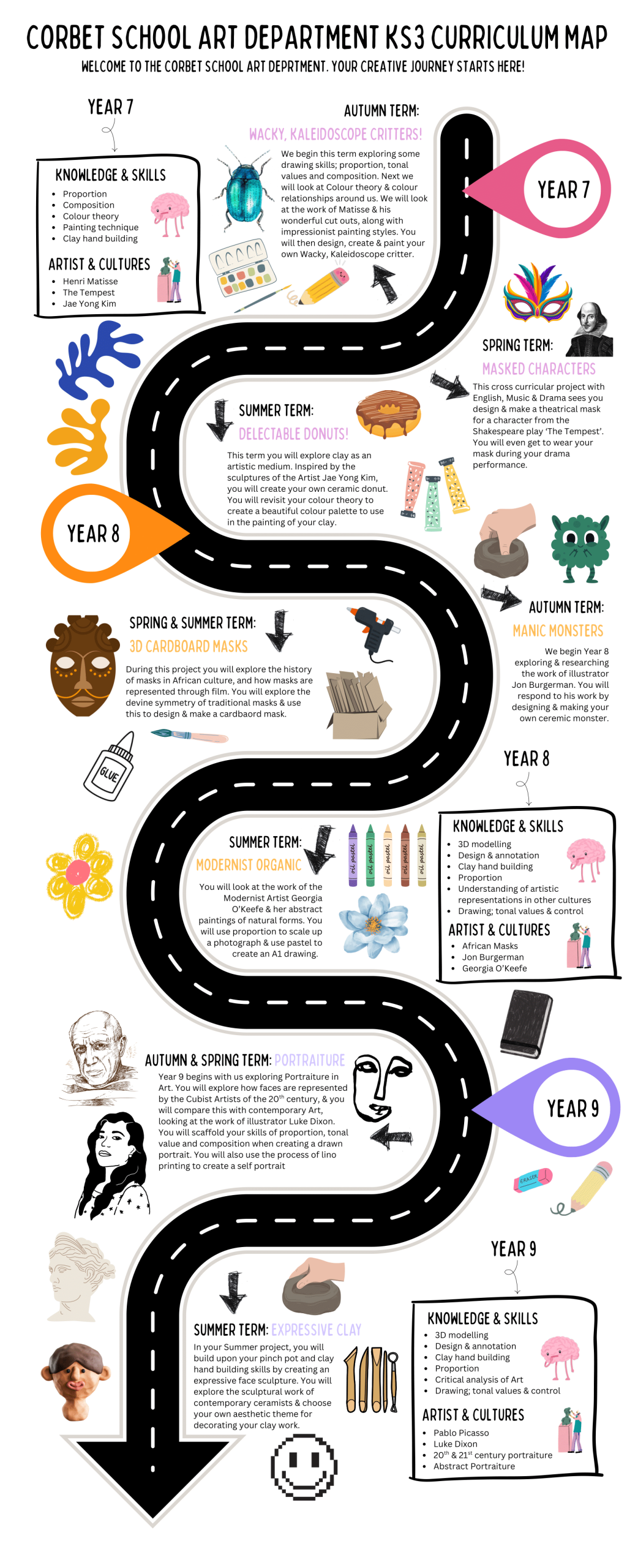
The year 7 computing topics are as follows –
- Digital Literacy
- E-Safety
- Spreadsheets
- Introduction to Computer Science
- Programming with Microbits
The year 8 computing topics are –
- Computer Crime and Cyber Security
- Networks
- Algorithms
- Programming in Small Basic
- Game Making / Programming / with Microbits
The year 9 computing topics are –
- Networks
- Algorithms
- Programming in Python
- Video and Sound Editing
- Office & Web Searching Skills
Year 7
- Food:
In Year 7 students develop basic cooking skills. Topics include food hygiene, health and safety and an investigation into the environmental issues relating to food. Students will cook a variety of savoury and sweet dishes with an emphasis on eating a healthy balanced diet.
- Textiles:
Cotton tote bag
Students will design and make a cotton tote bag. Within this brief they will use the theme of ‘doodle art’ as a basis for their design ideas. They will tie dye a piece of fabric and create a pocket for the front of their bag. They will learn basic hand sewing skills and then use the sewing machines to construct their bags. The decoration will be applied using fabric pens and will incorporate the theme of doodle art.
- Product Design:
Travel game
Students will design and make a travel game to a given theme. They will research and develop a brief, develop a specification and from this generate ideas for designs. Using CAD (computer aided design) software they model and test their designs, before finishing their designed product. Pupils will learn about the properties and uses of a range of timbers and manufactured boards.
Wooden truck project
Students will learn to develop basic design communication skills including sketching, drawing controlled lines, 3D sketching, annotation, emphasising key points and knowing which points to highlight to get their design ideas across. Pupils will also learn how to use a range of workshop tools and equipment safely to make quality products.
Metal key tag
Students design and make a metal key tag. They will use a range of metal working tools and equipment and learn about the properties and uses of metals and alloys.
Year 8
- Food:
Building on the skills taught in year 7 students will learn about the function of nutrients in their diet and the importance of eating a healthy balanced diet. Students will develop their practical skills by cooking more complex dishes.
- Textiles:
Creative techniques – soft sculpture of a crisp packet
Students will research different types of soft sculpture before using a current artist to inspire them to create a soft sculpture of a crisp packet. This will allow them to focus on hand sewing techniques and applique. They will also use CAD/CAM to create the lettering for their crisp packet and develop their sewing machine skills further when using them to construct their design.
- Product design:
Bottle opener
Building on the knowledge and skills pupils learned in year 7, they will further develop their skills in working with metals. They will model and test their designs to develop an ergonomically designed handle for a bottle opener and will then go to make the metal part and use heat treatment techniques to protect the metal.
Bluetooth amplifier
Students will design and make a Bluetooth amplifier incorporating recyclable materials. Students will investigate the use of non-sustainable and sustainable materials in design and look at the impact of these on the world’s resources. Students are asked to use ‘Responsible design’ in their work which involves thinking about what happens to a product at the end of its useful life.
Crumble programmable microcontrollers
Students will use programmable kits to build buggies, robots, alarms and other sensing circuits. Students are given the opportunity to respond to real world scenarios e.g. flooding, then design and model working prototypes/systems to solve these problems.
Year 9
- Food:
The practical elements of the year 9 food syllabus focus on enabling students to plan, prepare and cook meals independently. Theory topics focus on factors that influence what we choose to eat and help prepare students who may wish to study food at GCSE level.
- Textiles:
Personal project – Inspirational people cushion cover
Students will be using lots of different creative techniques to model a variety of repeat print patterns. This will develop further when they choose their own inspirational theme. They then go on to research their own theme helping them develop ownership of the project and allow them to be creative. The theme must then be applied to fabric and constructed into a cushion cover. The main focus is how to develop an idea and create a final piece.
- Product design:
Colour changing lamp
Students design and make a USB powered lamp based on a theme or design style. Students will investigate decorative and functional lighting; develop design ideas, model, and test their designs and make their final product. Students are encouraged to use the full repertoire of skills and techniques they have developed during years 7 and 8 including CAD/CAM (computer aided manufacture)
Jewellery design and packaging
Developing skills in CAD/CAM, pupils will make a laser cut mould which will allow them to make a pewter cast item of jewellery. Students will then develop the packaging together with graphic designs to go onto the packaging and evaluate their finished product.
YEAR 7
In year 7 pupil experience units of work on: storytelling (Jack and the Beanstalk); body language; spontaneous improvisation; Rose Blanche; evacuees; using soundscape; and a cross curricular unit with music and art on William Shakespeare’s The Tempest.
YEAR 8
In year 8 pupils experience units of work on: melodrama; pantomime; externalised conscience (Jo); status; David Almond’s the Savage; using tableaux to stimulate performance.
Year 9
In year 9 pupils experience units of work on: soap opera; Greek theatre; Hillsborough; The First World War; ritual drama; Shakespeare’s The Seven Ages of Man speech from As You Like It; mountain language (based on Harold Pinter); protest and persuasion; and, Charles Causley’s What Has Happened to Lulu. In year 9 pupils will also produce their own final piece of drama based on a stimulus.
Year 7
Monarchs, Monks and Migrants
Exploring the origins of Britain through the monarchy, church and migration of peoples.
Year 8
Cavaliers, Colonies and Coal
Looking at English Civil war, British expansion around the world including the slave trade and the industrial revolution.
Year 9
Trenches, Treaties and Terror
Exploring the First World War, looking at the 1930's and the emergence of extreme regimes in Europe which led to WWII and looking at the events of the Second World War.
The year 7 Geography topics are as follows –
- Map & Atlas Skills
- Rocks & Resources
- The UK
- The Rural Environment
- Rivers
- Enquiry Skills
The year 8 Geography topics are –
- Europe
- Weather & Climate
- Population Change
- Ice on the Land
- Volcanoes & Earthquakes
- Tourism
The year 9 Geography topics are –
- Globalisation
- Coasts
- The Development Gap
- Middle East
- Ecosystems
- Urban Environments
KS3 Geography Pathway
The MFL Curriculum at the Corbet School
All pupils in Year 7 will be allocated a language to study (French or Spanish). They will study one language for the rest of their time at school resulting in a GCSE qualification at the end of Year 11.
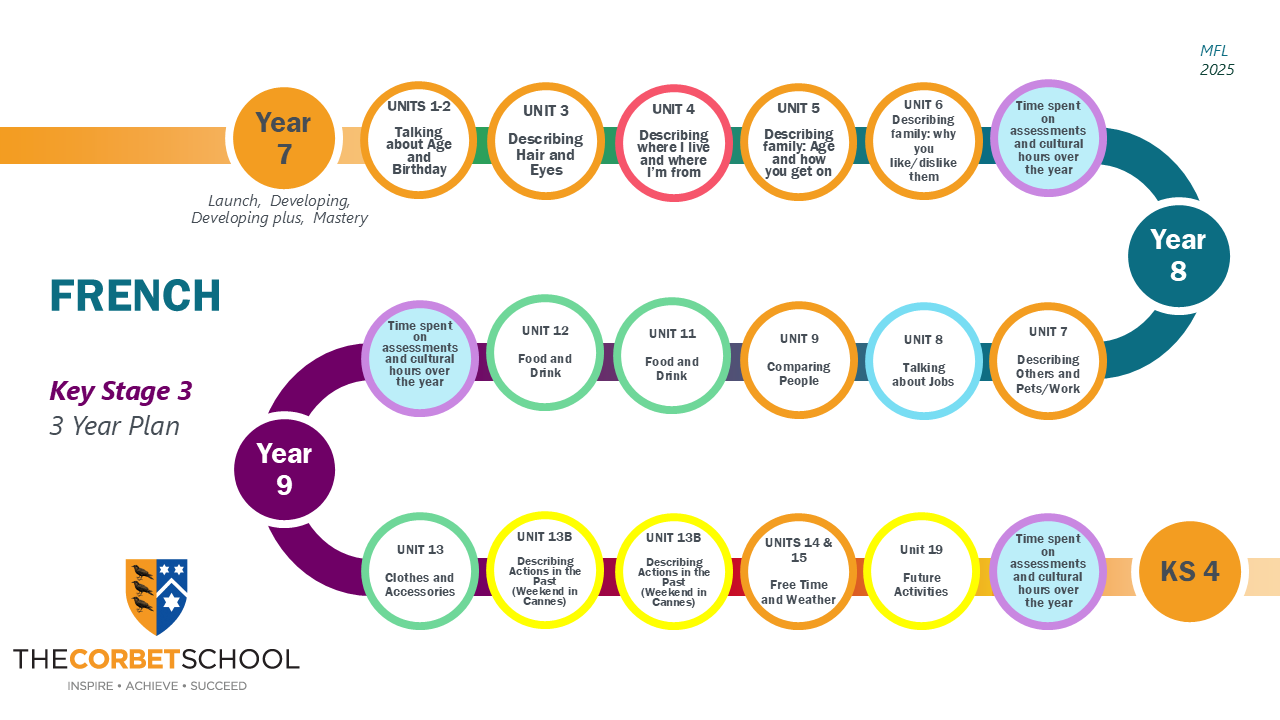
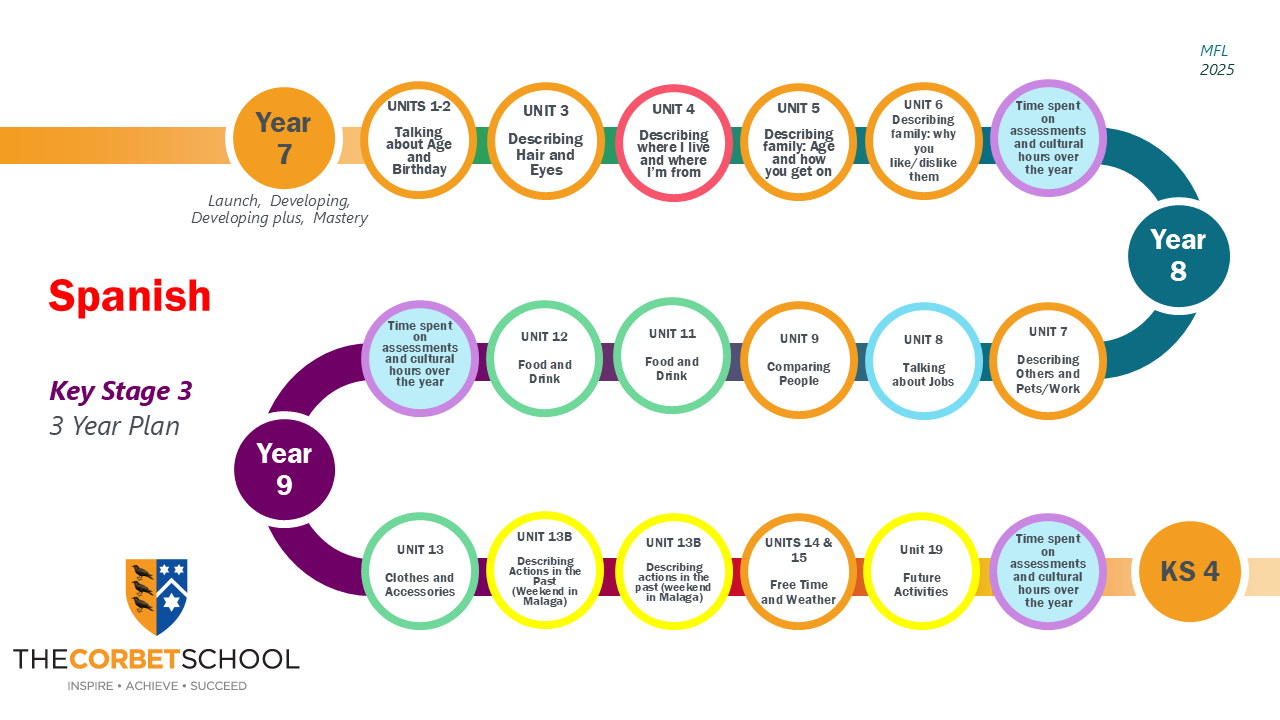
KS3 Overview
A streamlined selection of key language patterns will be taught with an emphasis on repetition, recycling, and rehearsing with most teaching and learning activities linked to sentence builders. Pupils will learn phrases or chunks with a long-term aim of internalising the target language. Listening and reading activities (receptive skills) will be used to introduce new language patterns. Speaking and writing activities will consolidate and strengthen these new structures, with a view to pupils being able to speak and write with greater spontaneity and confidence (productive skills).
Interleaving (referring to key language patterns and chunks on a regular basis) will be an essential part of teaching, giving pupils plenty of opportunity to recycle language from parts of the term or year. Teachers will follow Dr Gianfranco Conti’s MARSEARS approach of EPI (Extensive Processing Instruction) over the course of years 7 to 9. This means focusing on patterns and chunks of language, rather than isolated words and grammar rules. Thus, the aim of our curriculum design is increased spontaneity and internalisation of language.
Homework and revision website link: Language Gym - Home
The music curriculum at The Corbet School is designed to:
- engage and inspire pupils to develop a love of music through broad, balanced and comprehensive study.
- increase self-confidence, creativity and sense of achievement.
- allow pupils to develop a critical engagement with music.
Specifically, lessons are structured for pupils to:
- perform, listen to, review and evaluate music across a range of historical periods, genres, styles and traditions.
- develop their vocal and instrumental skills (solo & ensemble) with a focus on fluency, accuracy and expressiveness.
- create and compose music on their own and with others.
- use technology appropriately
- understand and explore how music is created, produced and communicated from a range of composers and musicians
- become familiar with the musical elements: pitch, duration, dynamics, tempo, timbre, texture, structure and appropriate musical notations in a range of genres and traditions.
A range of extracurricular activities are available throughout the week that pupils can attend to further their musical experiences at The Corbet School. Performance platforms occur throughout the year to allow pupils to develop their confidence to perform and raise the profile of the subject amongst the student body. All pupils are given the opportunity to learn a musical instrument should they wish to do so.
KS3 Music Road Map:
Year 7
- Netball,
- Football
- Rugby
- Fitness
- Basketball
- Gymnastics
- Tennis
- Striking and Fielding
- Athletics
Year 8
- Netball
- Football
- Rugby
- Fitness
- Basketball
- Gymnastics
- Tennis
- Striking and Fielding
- Athletics
Year 9
- Netball
- Football
- Rugby
- Fitness
- Badminton
- Table Tennis
- Tennis
- Striking and Fielding
- Athletics
- Theory
RE at KS3 is based on two assessment objectives. AO1 and AO2.
Assessment Objective 1 skills include being able to describe, explain and analyse, using knowledge and understanding. Learning about religion.
Assessment objective 2 skills include being able to use evidence and reasoned argument to express and evaluate personal responses, informed insights, and differing viewpoints. Learning from religion.
Below is a list of the topics we study in each year of KS3.
Year 7
- Belief and Belonging
- Christianity
- Religious Stories
- Buddhism
- Ethical Issues
Year 8
- Rites of passage
- Judaism
- Codes for life
- A study of Islam
- Hinduism
- Spirited Arts
Year 9
- Philosophy of God
- The Holocaust
- Prejudice and Discrimination
- Relationships
- Life after Death

